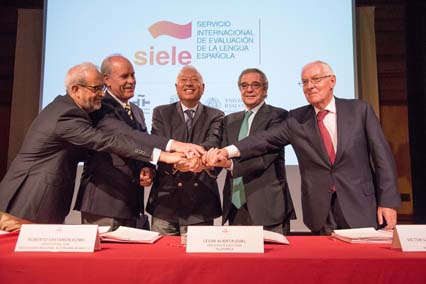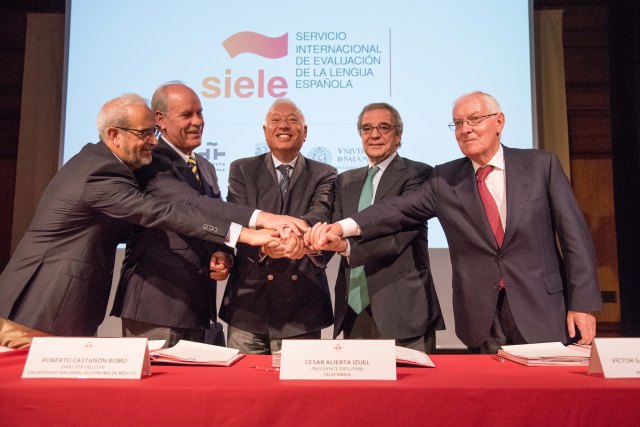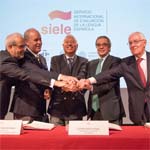– The Spanish Language International Assessment Service is a certification project open to all Spanish-speaking countries.
– The Minister of Foreign Affairs, José Manuel García-Margallo, and the Minister of Education, Culture and Sport, Íñigo Méndez de Vigo, took part in the presentation.
– It has been promoted by the Cervantes Institute, the University of Salamanca and the National Autonomous University of Mexico (Spanish initials: UNAM), and developed by Telefónica, due to be operational in January 2016.

Madrid, 3 September 2015.- Today, at the headquarters of the Cervantes Institute, the director of the Institute, Víctor García de la Concha; the rector of the University of Salamanca, Daniel Hernández Ruipérez; the director of the Education Centre for Foreigners at UNAM, Roberto Castañon Romo and Telefónica chairman, César Alierta Izuel, presented the Spanish Language International Assessment Service (Spanish initials: SIELE), a system which will enable the degree of proficiency in the Spanish language to be certified by electronic means.
The Minister of Foreign Affairs, José Manuel García-Margallo, and the Minister of Education, Culture and Sport, Íñigo Méndez de Vigo, also took part in the presentation of SIELE (www.siele.org/), a project which is open to all universities in Spanish-speaking countries. At this time the protocol to mark the beginning of digital collaboration with Telefónica, the company responsible for the technological development and the marketing of the Service, was signed.
The project, presented before the King and Queen of Spain in Mexico DF on 30 June by the three supporting organisations, formally starts today with the aim of setting the benchmark for electronic exams, which can be taken quickly and easily. It was launched to respond to the growing demand for assessment and certification of the Spanish language, and is aimed both at students of our language all over the world – 21 million people, according to the latest Cervantes Institute report – as well as native speakers.
Extending Certification Provision
The SIELE will exist alongside the DELE Spanish diploma, the official diploma with indefinite validity and international recognition, that has around 70,000 candidates per year and which is taken in more than 900 examination centres in a hundred countries. In this way, the Cervantes Institute diversifies its provision of Spanish proficiency certification and extends its range of exams devised for different types of users.
The SIELE will be in operation early next year and is expected to reach 300,000 candidates in the first phase, rising to 750,000 over the following five years.
There will be examination centres on all five continents, but during the first three years it will be implemented specifically in three countries: Brazil, where it is expected that, during that period, 120 examination centres will be set up, covering 81% of the territory; the US, where there will be 100 examination centres with a coverage of 70%; and China, with 60 examination centres and 61% coverage.
The exam consists of four tests: reading comprehension, listening comprehension, written expression and interaction, and oral expression and interaction. The marking of the first two will be automatic, while the other two will be assessed by accredited experts.
The interested party may take the full exam (for which they will receive a certificate) or one or several tests independently (as a result of which they will receive a report). Results will take no longer than three weeks. The certificates will be valid for two years.
Both registration and the exam will be conducted electronically via an online connection. The exam can be taken, by appointment, in approved centres throughout the year.
The tests will be created by teams of experts with extensive experience in the preparation of certifying exams, from the Cervantes Institute, UNAM and the University of Salamanca. This is an example of cooperation among institutions of the Hispanic world to offer a single assessment service which incorporates all the different variations of Spanish.
The SIELE will pay particular attention to the treatment of different variations of the Spanish language. The reading texts and the listening tests will incorporate the different geographical nuances of the language, while in candidates’ written and oral production, all Hispanic standards will be allowed.
The project has been created jointly by the Cervantes Institute, which has a presence in 90 cities around 43 countries, and which constitutes the most important international organisation dedicated to the teaching of Spanish; UNAM, which is the largest university in the Hispanic world and has the prestigious Education Centre for Foreigners (Spanish initials: CEPE), founded in 1921; and the University of Salamanca, founded in the 13th century, which created the international courses back in 1929.

Photo 1 of 1
At the image from left to right: the rector of the University of Salamanca, Daniel Hernández Ruipérez; the director of the Education Centre for Foreigners at UNAM, Roberto Castañón Romo; the Minister of Foreign Affairs, José Manuel García-Margallo; Telefónica chairman, César Alierta Izuel and the director of the Institute, Víctor García de la Concha.









